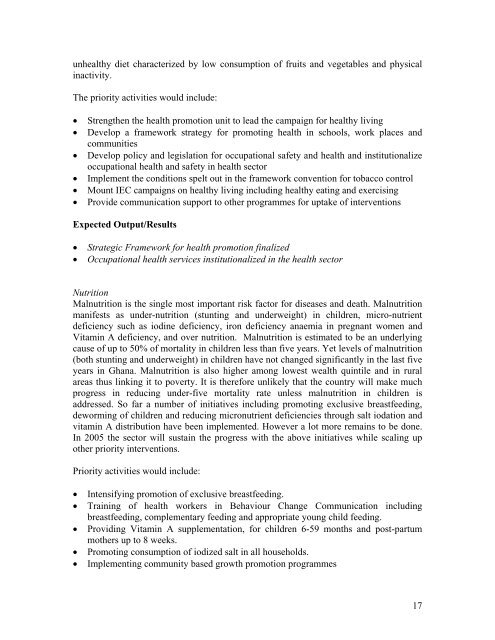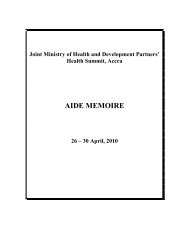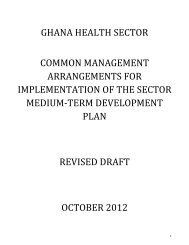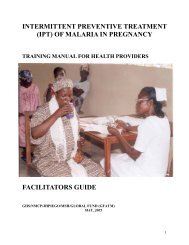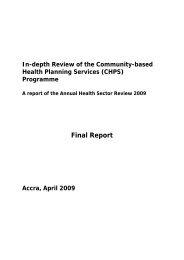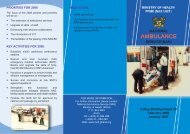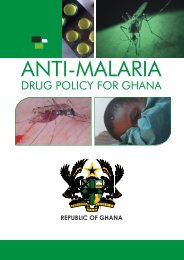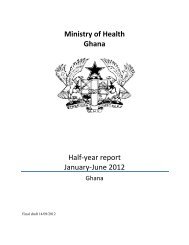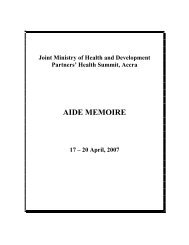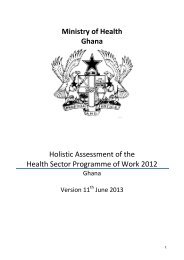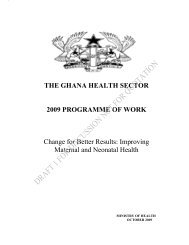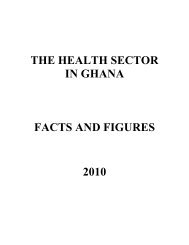Annual Programme of Work 2005 - Ministry of Health
Annual Programme of Work 2005 - Ministry of Health
Annual Programme of Work 2005 - Ministry of Health
Create successful ePaper yourself
Turn your PDF publications into a flip-book with our unique Google optimized e-Paper software.
unhealthy diet characterized by low consumption <strong>of</strong> fruits and vegetables and physical<br />
inactivity.<br />
The priority activities would include:<br />
• Strengthen the health promotion unit to lead the campaign for healthy living<br />
• Develop a framework strategy for promoting health in schools, work places and<br />
communities<br />
• Develop policy and legislation for occupational safety and health and institutionalize<br />
occupational health and safety in health sector<br />
• Implement the conditions spelt out in the framework convention for tobacco control<br />
• Mount IEC campaigns on healthy living including healthy eating and exercising<br />
• Provide communication support to other programmes for uptake <strong>of</strong> interventions<br />
Expected Output/Results<br />
• Strategic Framework for health promotion finalized<br />
• Occupational health services institutionalized in the health sector<br />
Nutrition<br />
Malnutrition is the single most important risk factor for diseases and death. Malnutrition<br />
manifests as under-nutrition (stunting and underweight) in children, micro-nutrient<br />
deficiency such as iodine deficiency, iron deficiency anaemia in pregnant women and<br />
Vitamin A deficiency, and over nutrition. Malnutrition is estimated to be an underlying<br />
cause <strong>of</strong> up to 50% <strong>of</strong> mortality in children less than five years. Yet levels <strong>of</strong> malnutrition<br />
(both stunting and underweight) in children have not changed significantly in the last five<br />
years in Ghana. Malnutrition is also higher among lowest wealth quintile and in rural<br />
areas thus linking it to poverty. It is therefore unlikely that the country will make much<br />
progress in reducing under-five mortality rate unless malnutrition in children is<br />
addressed. So far a number <strong>of</strong> initiatives including promoting exclusive breastfeeding,<br />
deworming <strong>of</strong> children and reducing micronutrient deficiencies through salt iodation and<br />
vitamin A distribution have been implemented. However a lot more remains to be done.<br />
In <strong>2005</strong> the sector will sustain the progress with the above initiatives while scaling up<br />
other priority interventions.<br />
Priority activities would include:<br />
• Intensifying promotion <strong>of</strong> exclusive breastfeeding.<br />
• Training <strong>of</strong> health workers in Behaviour Change Communication including<br />
breastfeeding, complementary feeding and appropriate young child feeding.<br />
• Providing Vitamin A supplementation, for children 6-59 months and post-partum<br />
mothers up to 8 weeks.<br />
• Promoting consumption <strong>of</strong> iodized salt in all households.<br />
• Implementing community based growth promotion programmes<br />
17


